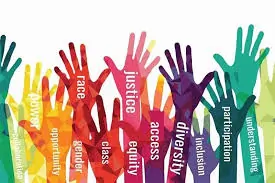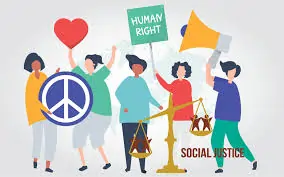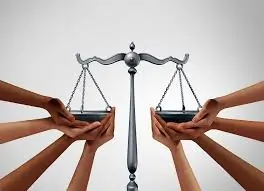Voices of Equity | Navigating the Path to Social Justice

ADVERTISEMENT

Table of Contents
Key Takeaways:
- Social justice hinges on the principles of equality and fairness, ensuring everyone has equal rights and opportunities.
- Understanding the historical context and evolution of these concepts is crucial for addressing systemic discrimination and biases.
- Promoting equity in resource distribution is essential to creating a more just society.
ADVERTISEMENT

Introduction
In the quest for a fairer and more equitable society, the principles of social justice stand tall, serving as guiding beacons for collective progress.
At the heart of this noble pursuit lie two fundamental pillars: equality and fairness. These principles not only define the essence of social justice but also serve as the bedrock upon which a just society is built.
Social justice is a concept deeply rooted in the quest for fairness, equality, and dignity for all members of society. It encompasses the belief that every individual deserves equitable treatment, opportunities, and rights, regardless of their background, identity, or circumstances.
At its core, social justice seeks to address systemic injustices and disparities that result in the marginalization and oppression of certain groups while privileging others.
This includes recognizing and challenging discrimination based on factors such as race, ethnicity, gender, sexual orientation, socioeconomic status, disability, and more.
The pursuit of social justice is not a new phenomenon but rather an ongoing struggle that has shaped societies throughout history.
From the civil rights movements of the 20th century to contemporary activism for gender equality, LGBTQ+ rights, and environmental justice, individuals and communities have continually fought against injustice and advocated for a more equitable and inclusive world.
These movements have highlighted the interconnectedness of various forms of oppression and the importance of addressing root causes rather than symptoms alone.
Central to the concept of social justice is the principle of human dignity, which asserts that every person has inherent worth and deserves to be treated with respect and compassion.
This principle underpins efforts to challenge discrimination, violence, and exploitation in all its forms, recognizing that upholding human dignity is essential for building a just and humane society.
Moreover, social justice emphasizes the importance of recognizing and valuing diversity, as well as fostering inclusivity and belonging for all individuals, regardless of differences.
Achieving social justice requires a multifaceted approach that addresses both immediate concerns and underlying structural issues. This involves not only advocating for policy changes and legal reforms but also challenging cultural norms, attitudes, and behaviors that perpetuate inequality and discrimination.
It requires collective action and solidarity among individuals, communities, and institutions to dismantle oppressive systems and create new frameworks that prioritize justice, equity, and human rights.
In conclusion, social justice is a fundamental principle that guides efforts to create a more just, equitable, and inclusive society.
It involves recognizing and challenging systemic injustices, advocating for the rights and dignity of marginalized communities, and fostering a culture of empathy, respect, and solidarity.
While the pursuit of social justice is a complex and ongoing endeavor, it is essential for building a world where every individual can thrive and live with dignity and equality.
Definition of Social Justice
Social justice embodies the notion of creating a society where every individual, regardless of their background, enjoys equal rights, opportunities, and treatment. It aims to rectify historical injustices, dismantle systemic barriers, and foster inclusivity and fairness for all members of society.
Importance of Equality and Fairness in Social Justice
Equality and fairness are not mere abstract concepts but the very essence of social justice. They form the backbone of a society where every person, irrespective of race, gender, socioeconomic status, or other identities, is treated with dignity and respect.
Without equality and fairness, the lofty ideals of social justice remain elusive dreams, perpetuating inequality and division.
ADVERTISEMENT

Understanding Equality and Fairness

Definitions and Distinctions
Equality refers to the principle of ensuring that everyone has the same rights, opportunities, and treatment, regardless of differences. Fairness, on the other hand, entails impartiality and justice in decision-making and allocation of resources.
While equality focuses on outcomes, fairness emphasizes the processes that lead to those outcomes.
Historical Context and Evolution
The journey towards achieving equality and fairness has been fraught with struggles and triumphs throughout history. From the civil rights movements to the fight for gender equality, humanity has continually strived to overcome injustices and forge a more equitable society.
However, this journey is ongoing, marked by progress as well as setbacks, underscoring the need for sustained efforts to uphold these principles.
The Role of Equality and Fairness in Social Justice:
Ensuring Equal Rights and Opportunities
Equality serves as a powerful tool for dismantling systemic barriers and ensuring that all individuals have equal access to rights and opportunities.
Whether it’s in education, employment, or civic participation, promoting equality fosters a society where merit, not privilege, determines one’s success.
Addressing Systemic Discrimination and Biases
Fairness plays a crucial role in addressing systemic discrimination and biases embedded within institutions and societal structures.
By promoting fair policies and practices, we can challenge existing power dynamics and create a more inclusive environment where everyone has a chance to thrive.
Promoting Equity in Resource Distribution
Equity goes beyond mere equality by recognizing and addressing the unique needs and circumstances of different individuals and communities.
It calls for a redistribution of resources to ensure that marginalized groups have access to the same opportunities and outcomes as their privileged counterparts.
In conclusion, the pursuit of social justice requires a steadfast commitment to the principles of equality and fairness.
By upholding these values, we can build a society where justice is not just a lofty ideal but a lived reality for all. As we navigate the complexities of our world, let us remember that the best rule is indeed being equal and fair.
In the ongoing pursuit of a just society, one principle stands tall above all: the unwavering commitment to equality and fairness.
Yet, this noble aspiration is often met with formidable challenges, stemming from structural inequalities, implicit biases, and the complex interplay of various forms of discrimination.
However, in the face of adversity, there exist potent strategies to promote equality and fairness, ranging from legislative reforms to grassroots activism.
Challenges to Equality and Fairness

Structural Inequalities
At the heart of the struggle for social justice lie deeply entrenched structural inequalities. These disparities, rooted in historical injustices and perpetuated by systemic biases, manifest in various facets of society, including access to education, employment opportunities, healthcare, and justice.
Structural inequalities not only hinder individual advancement but also undermine the very fabric of equality and fairness, erecting barriers that impede progress and perpetuate injustice.
Implicit Biases and Stereotypes
Despite our best intentions, implicit biases and stereotypes wield significant influence, shaping perceptions and decision-making processes in subtle yet profound ways.
These ingrained prejudices, often unconscious, can lead to discriminatory practices and perpetuate unequal treatment across diverse populations.
Whether in hiring practices, law enforcement, or everyday interactions, unchecked biases pose formidable obstacles to achieving true equality and fairness.
Intersectionality and Multiple Forms of Discrimination
Recognizing the multifaceted nature of human identity is paramount in understanding the complexities of discrimination.
Intersectionality highlights the interconnectedness of various social categorizations, such as race, gender, sexuality, class, and disability, and underscores how individuals experience overlapping forms of discrimination.
Failure to address intersectionality can result in marginalized groups facing compounded injustices, further widening the gap between privilege and oppression.
Strategies for Promoting Equality and Fairness:
Legislative Measures and Policy Reforms
Legislation serves as a cornerstone in the fight against inequality, offering a framework for enshrining rights, dismantling discriminatory practices, and promoting inclusive policies.
Robust anti-discrimination laws, affirmative action initiatives, and measures to address systemic biases within institutions are essential steps towards fostering a more equitable society.
Moreover, ongoing efforts to advocate for legislative reforms that prioritize equality and fairness are crucial in addressing structural inequities at their root.
Education and Awareness Campaigns
Education serves as a powerful tool for challenging prejudices, fostering empathy, and promoting understanding across diverse communities.
By integrating social justice principles into school curricula, promoting diversity and inclusion in educational settings, and engaging in public awareness campaigns, we can cultivate a culture of respect and solidarity.
Furthermore, fostering critical thinking skills and encouraging dialogue on issues of privilege and oppression are essential in combating implicit biases and stereotypes.
Community Organizing and Grassroots Activism
The strength of social movements lies in the collective voice of individuals united in their pursuit of justice.
Through grassroots organizing, community mobilization, and advocacy efforts, ordinary citizens can effect meaningful change at the local, national, and global levels.
By amplifying marginalized voices, holding institutions accountable, and advocating for systemic reforms, grassroots activism serves as a catalyst for transformative action towards greater equality and fairness.
In conclusion, the path to social justice is fraught with challenges, yet guided by the steadfast commitment to equality and fairness, we can overcome these obstacles and build a more just and inclusive world for all.
By confronting structural inequalities, addressing implicit biases, and embracing intersectionality, and by employing strategies such as legislative reforms, education, and grassroots activism, we can collectively pave the way towards a future where justice prevails and every individual is afforded dignity, respect, and equal opportunity.
In the ongoing quest for a more just and equitable society, the principles of equality and fairness stand as unyielding pillars. As we navigate through various civil rights movements, gender equality initiatives, and economic justice campaigns, it becomes increasingly evident that these values are not just ideals to strive for but essential guidelines for shaping a better world.
Case Studies and Examples
ADVERTISEMENT

Civil Rights Movements:
The Civil Rights Movement in the United States serves as a powerful testament to the transformative power of collective action in pursuit of equality.
From the tireless efforts of leaders like Martin Luther King Jr. to the bravery of countless individuals who marched, protested, and advocated for change, this movement challenged systemic racism and segregation, paving the way for significant legislative victories such as the Civil Rights Act of 1964.
The struggle for civil rights continues today, as marginalized communities fight against discrimination and injustice in various forms, reminding us that the battle for equality is ongoing.
Gender Equality Initiatives:
Gender equality initiatives have made remarkable strides in recent decades, yet significant disparities persist.
From the #MeToo movement highlighting the prevalence of sexual harassment and assault to advocacy for equal pay and representation in leadership positions, there is a growing recognition of the importance of dismantling patriarchal structures and promoting gender inclusivity.
Initiatives aimed at empowering women, transgender individuals, and non-binary people not only seek to rectify existing inequalities but also challenge societal norms and stereotypes that perpetuate discrimination.
Economic Justice Campaigns:
Economic justice campaigns focus on addressing socioeconomic disparities and advocating for policies that prioritize the well-being of marginalized communities.
From calls for a living wage and affordable housing to efforts to combat wealth inequality and ensure access to essential services such as healthcare and education, these campaigns aim to create a more equitable distribution of resources and opportunities.
Movements like Occupy Wall Street and grassroots organizing efforts in low-income communities underscore the urgency of addressing economic injustice and building a more inclusive economy that works for everyone.
Conclusion
Social justice is a multifaceted concept that seeks to address systemic inequalities and ensure fair treatment and opportunities for all individuals within society.
Throughout history, various movements and thinkers have advocated for social justice, recognizing that factors such as race, gender, socioeconomic status, and more can significantly impact an individual’s life experiences and opportunities.
In contemporary discourse, achieving social justice often involves dismantling oppressive structures, advocating for marginalized communities, and promoting equality and equity in all aspects of life.
At its core, social justice demands recognition of the inherent dignity and worth of every person, regardless of their background or circumstances.
This principle emphasizes the importance of treating all individuals with respect, compassion, and fairness, regardless of differences in race, ethnicity, religion, gender identity, sexual orientation, disability, or any other characteristic.
By prioritizing human dignity, social justice aims to create a society where everyone has the opportunity to thrive and fulfill their potential, free from discrimination and prejudice.
However, achieving social justice is not merely about individual attitudes or behaviors; it requires addressing broader systemic issues that perpetuate inequality and injustice.
This includes examining the ways in which institutions, laws, policies, and cultural norms contribute to the marginalization of certain groups while privileging others.
From disparities in education and healthcare to unequal access to employment and housing, systemic injustices are pervasive and deeply ingrained in many aspects of society.
Furthermore, social justice necessitates active engagement and advocacy to challenge and change these systems of oppression.
This involves amplifying the voices of marginalized communities, raising awareness about issues of injustice and inequality, and mobilizing collective action to demand meaningful change.
Whether through grassroots organizing, policy advocacy, or community activism, individuals and groups can play a crucial role in advancing social justice and creating a more equitable and inclusive society.
In conclusion, social justice is a fundamental principle that guides efforts to address inequality, oppression, and discrimination in society.
By recognizing the inherent worth and dignity of all individuals, challenging systemic injustices, and advocating for meaningful change, we can work towards building a more just and equitable world where everyone has the opportunity to thrive and live with dignity and respect.
Achieving social justice requires ongoing commitment and effort from individuals, communities, and institutions, but the pursuit of a fairer and more inclusive society is essential for the well-being and flourishing of all people.
Recap of the Importance of Equality and Fairness in Social Justice:
At the heart of social justice lies the fundamental belief that every individual deserves equal rights, opportunities, and dignity.
Equality and fairness are not mere abstract concepts but tangible principles that guide our actions and shape the fabric of our society.
Whether we are advocating for civil rights, gender equality, or economic justice, our ultimate goal is to create a world where justice is not just a privilege but a universal reality.
Call to Action for Advancing Equality and Fairness in Society:
As we reflect on the lessons learned from civil rights movements, gender equality initiatives, and economic justice campaigns, it is clear that our work is far from over.
We must remain vigilant in challenging injustice wherever it exists and actively work towards building a more equitable and fair society. This requires collective action, solidarity across diverse communities, and a steadfast commitment to upholding the principles of equality and fairness in all aspects of our lives.
By standing together and advocating for positive change, we can create a future where social justice is not just an aspiration but a lived reality for all.
ADVERTISEMENT

You May Also Like
Ciara Annie Duke is an American former professional poker player and author in cognitive-behavioral decision science and decision education. She is not just a brilliant business consultant and book author, but also a professional poker player and teacher. Annie is an author, speaker, and consultant in the decision-making space. Annie loves to dive deep into decision making under uncertainty. Her latest obsession is on the topic of quitting. In particular, she is on a mission to rehabilitate the term and get people to be proud of walking away from things.
Duke has created a true masterpiece that not only reveals the secrets of successful betting, but also teaches how to make decisions in the face of uncertainty. You’d be surprised, but it was she who led Ben Affleck to win a major tournament. Personal accomplishments include owning a WSOP bracelet and winning $4 million in prize money. This girl’s book is sure to change the way you think.
In addition to her writing, she offers a holistic approach that should be viewed in the big picture rather than individual stories. The book is a tremendous success among users and receives the highest feedback. By the way, The New York Times described her book as an example of a modern investment scheme. The book does not focus on specific solutions to certain situations, but teaches how to find solutions and analyze possible outcomes.